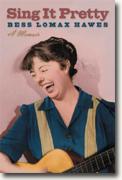Sing It Pretty
Bess Lomax Hawes
book reviews:
· general fiction
· chick lit/romance
· sci-fi/fantasy
· graphic novels
· nonfiction
· audio books
· author interviews
· children's books @
curledupkids.com
· DVD reviews @
curledupdvd.com
newsletter
win books
buy online
links
home
for authors
& publishers
for reviewers

 |
Sing It Pretty: A Memoir (Music in American Life) Bess Lomax Hawes University of Illinois Press Hardcover 216 pages April 2008 |
|
This is an articulate, ladylike memoir of times that were not always so genteel. Bess Lomax Hawes lived through the folk revival of the 1950s, the folk revolution of the 1960s, and the folk enshrinement of subsequent years with few scars, or none that she wants us to see. Her tone throughout this fact-filled well paced memoir remains calm and modest.
That sense that "it had to be done" was a guiding principle of the life of Bess Lomax Hawes. Driven by the sometimes muddled but always idealistic philosophy of the Left in mid-twentieth century, convinced that they were making, or were about to make at any minute, an impact on the events of the day, Bess and her cohorts - Pete Seeger, Woody Guthrie, Aunt Molly Jackson, Burl Ives, Alan Lomax, et al. - were sure that everything they did in the name of the folk "had to be done." So they simply did. As part of the Almanac Singers, which included at various times, Pete, Woody, and her husband-to-be, Butch Hawes, Bess stretched herself to the limit to spread the new songs of revolution and the old songs of love and loneliness. Bess's name never matched the touchstone status of her father or brother, or of Pete or Woody, and that could possibly have been due to the lesser status of women at the time when she was standing beside them. But Bess had brains and children to care for, and she was destined to affect the folk movement with more than simply her voice. She became a teacher of everything from basic guitar to ethnomusicology, proving to a generation of somewhat jaded middle-class college kids that they were part of the folk - after all, didn't they chant jump-rope songs and sing ditties as children that had clearly made their way from old Europe to the new world via a long chain of song-carriers? Bess graduated from Bryn Mawr, authored scholarly works and co-authored the well known "MTA Song," which put the Kingston Trio solidly on the charts. Later she became, as it were, instrumental in the dispensation of grants to worthy folk musicians through her work as director of the Folk and Traditional Arts Program at the National Endowment for the Arts. President Clinton awarded her a National Medal of the Arts in 1993. Bess, now in her eighties, frankly states that she has not done a great deal of fact-checking in putting together this chronicle, but one suspects that she is far more capable than the average person of remembering events accurately. Anyone at all empathic to the folk music subculture will find this book a gem of vignettes and, in its way, a history of the movement. It is always a notable paradox that the people who most want to affect and assist the "real folk" seem to spring from the middle and upper, educated classes, and so it was with Bess and her companions. Yet undoubtedly they did have an impact, did inspire and continue to enhance the musical life of our country. In the case of Bess herself, it was done with determination and decorum. Originally published on Curled Up With A Good Book at www.curledup.com. © Barbara Bamberger Scott, 2008 |
|
|
|
 Click here to learn more about this month's sponsor! |
|
| fiction · sf/f · comic books · nonfiction · audio newsletter · free book contest · buy books online review index · links · · authors & publishers reviewers |
|
| site by ELBO Computing Resources, Inc. | |
 Bess is the daughter of the well-known and greatly admired John Lomax, a man who took it upon himself, almost single-handedly, to define and disseminate American folk music. He discovered the great Leadbelly and other now-legendary figures of the American music pantheon. He walked into prisons, sometimes taking his impressionable but straight-spined daughter and her brother Alan, to listen to and record the wails and whomps of chain-gang blues. As a teen, Bess took on a tough assignment when she was required to transcribe the lyrics of, and set to music, one such powerful song, somewhere in the bowels of Angola Prison, a lifer's hell in the fiery canebrakes of southern Louisiana. She confesses, "I certainly didn't know what I was doing but nobody else there know how to do it either and it had to be done."
Bess is the daughter of the well-known and greatly admired John Lomax, a man who took it upon himself, almost single-handedly, to define and disseminate American folk music. He discovered the great Leadbelly and other now-legendary figures of the American music pantheon. He walked into prisons, sometimes taking his impressionable but straight-spined daughter and her brother Alan, to listen to and record the wails and whomps of chain-gang blues. As a teen, Bess took on a tough assignment when she was required to transcribe the lyrics of, and set to music, one such powerful song, somewhere in the bowels of Angola Prison, a lifer's hell in the fiery canebrakes of southern Louisiana. She confesses, "I certainly didn't know what I was doing but nobody else there know how to do it either and it had to be done."